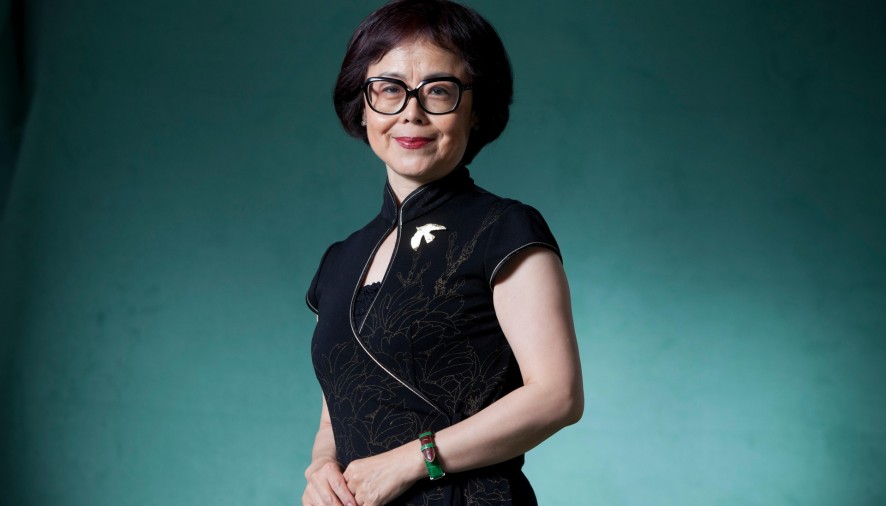Xue Xinran has spent the past forty years researching and interviewing the people of China, from the poor in the countryside to those whose lives have been overtaken by the isolation of the technological age. Here she chats to Editor-in-Chief Jessica Murray about her latest book, Buy Me The Sky, which tackles the repercussions of China’s one-child policy, ahead of her Meet the Authors talk at the Business School…
When I asked Xinran why she chose China’s one-child policy for the subject of her latest book, she replied simply, ‘I am a Chinese mum to a Chinese boy’. Xinran’s son, Panpan, was born in 1988 and is a product of the one-child policy which controlled the families of China from 1979 to October last year.
Xinran isn’t afraid of highlighting the positives of such a policy; the Chinese population has been reduced by some 400 million as a result and it has given the country a break from an increasingly tough war between population and food: “That’s a big gift to this planet, when we’re so overcrowded trying to share nature’s resources.”
Her latest book, Buy Me The Sky, is filled with interviews with children born during the one-child policy era in an attempt to understand and provide a voice for one of the most unique generations in history. As Xinran says, “I think it is important to give them a voice and listen to them. They are not just today’s China but also the future as well.”
“Your family is your first classroom. When you grow up you learn about sharing, conversation and fighting from your siblings. You share parents, a roof, space.
“So when the children come to the classroom, they don’t know how to respect each other or how to respect the teachers.”

Xinran mentions throughout our talk that family values are at the very heart of Chinese culture and by placing such an intrusive restriction on reproduction, the family dynamic has been turned upside down. Parents now shower their single child with adoration, offering to ‘buy them they sky’ if that’s what necessary to keep them happy, while the single children grow up with the burden and responsibility of caring for their parents and grandparents when they get old – China doesn’t have a pension system, with the duty falling to the younger generation to look after the old.
To demonstrate the long-lasting effects of the policy, Xinran refers to a story in which a promising first year university student accidentally hit a peasant woman with his car on his way home, and instead of helping her, he stabbed her to death with a fruit knife in fear that she would report him and ruin his future.
“The whole of China split in to three groups. One group said he should be punished because he killed someone, and he should be given the death penalty. Another group said that because he was a single child, giving him the death penalty would mean giving his parents and four grandparents the death penalty also. Even more shocking, another group of university students, from the single child generation, said they would do the same thing in that situation. They see their lives as having much more value than a peasant’s. That kind of impact is much bigger and deeper than the government or anyone thought would happen.”
Xinran is most well known for her first book, The Good Women of China, based on her time presenting a women’s hour on a radio show in China. While many often refer to the radio show as successful, she’s candidly open about the traumatic sense of failure she felt when producing the show. A number of the women who came on the show committed suicide shortly afterwards, leaving Xinran feeling helpless and frustrated.
“I found that so many Chinese are lonely because of our culture and education, and they were coming to me asking for help and I couldn’t help them
“I couldn’t sleep, and even now I get nightmares hearing their voices on the telephone. So this is the reason I gave up China. My health was very bad, I was taking 4-6 sleeping pills every night and I was drugging myself to death. Lots of people think I was successful in China, but I know in my heart and soul that it’s not true – I couldn’t help and I feel very guilty about that. I still do.”
Xinran is a keen advocate for women’s rights in China; not only does Chinese culture leave women lonely and voiceless, but the one-child policy has had an even more monumental effect on the female population. By 2020 there will be 30 million more men than women in China, a result of parents favouring a son over a daughter.
“Chinese society is worrying about those men and how they will find wives, but my question is, where are those 30 million missing girls? Where was their right to live?”
Her journalism and books go some way to opening up Chinese society and providing a voice for those who may go unreported, both in the censored Chinese media and a narrow minded British press.
In 2004 she also set up a charity, the Mother’s Bridge of Love, which helps Chinese girls adopted by Western families find their parents, simultaneously providing books and resources for the poorest villages in China.
As Xinran says, China is improving and becoming more open, with a host of new laws and reforms, but education is still severely lacking. “I think it is so important to give women more of a chance for education. It’s not about the big international or political things, it’s just the basic knowledge of what women’s rights are”.
Xinran visited Leeds University as part of Meet the Authors, a series that runs throughout the year with a range of interesting talks and speakers.
Jessica Murray

